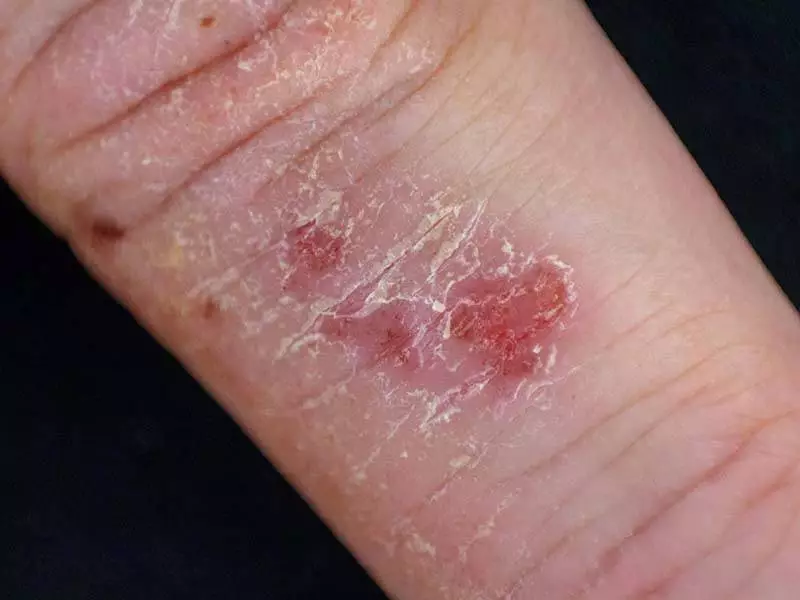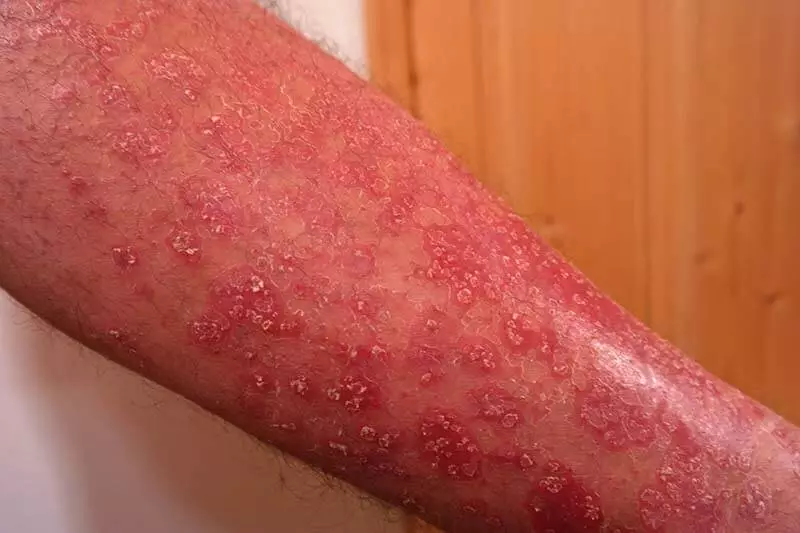Psoriasis is a chronic disease that causes inflammation in the skin. The most common symptoms include red, flaky, scaly patches of skin that itch, burn and bleed. Many people suffer from severe cases of this condition. In some instances, patients may also experience joint pain and swelling.
Some research suggests that genetics play a role in getting psoriasis. However, researchers have not yet figured out exactly what triggers it to develop. Some doctors believe that certain foods and alcohol consumption could be contributing factors. Others think stress is responsible for developing the issue. There’s no single cause that can explain why someone gets psoriasis.
In addition to these traditional treatments, there are many other natural remedies that you can try, such as using witch hazel. We will discuss how this works later on.

What Is Psoriasis?
Psoriasis is a skin disease characterised by scaly, red patches. The most common areas affected include the elbows, knees, scalp and back. Psoriasis affects approximately 2% of people in the United States. However, it is more prevalent among certain groups, such as African-Americans and Hispanics.
Although psoriasis is not contagious, some cases can be triggered by an infection. People with this disease may also experience joint pain, fatigue, depression, heart problems or nail disorders.
People with mild forms of the condition usually don’t require treatment. But, for those who suffer from moderate to severe cases, there are several treatments available. Treatments for this skin condition vary depending on the severity of the symptoms. These range from topical creams to prescription drugs.
Causes: what triggers psoriasis?
Psoriasis is an autoimmune disease. This means that the body starts attacking itself. It causes red patches of skin to appear.
There are different types of psoriasis, including plaque-type, guttate, erythrodermic, pustular and arthropathic. Some people only get one type, while others have more than one.
It’s important to note that there is no cure for this disease. But, you can treat it.
Treatment: how is psoriasis treated?
If you have psoriasis, you might be wondering what to do about it. There are many different treatments available for this skin condition. But, before you choose one, you need to think about your goals. Do you want to treat the symptoms of psoriasis or do you want to get rid of the disease entirely?
The best treatment is going to depend on your goal. For example, if you just want to use a topical cream, then you can start with that. However, it’s important to remember that you will only see results after a few months. So, you need to make sure that you stick to the treatment plan.
Another option is to take a prescription medication. These include methotrexate (an anti-inflammatory), cyclosporine A, acitretin and etanercept. This will help control the symptoms of your condition. You should also talk to your doctor about which medications are right for you. You should make sure that they’re working properly and that you don’t have any side effects. If all of this fails, you could even consider taking a biologic agent.
You can also try natural remedies, such as witch hazel. This powerful extract works as an astringent. It helps to draw out toxins and dry up pimples and blemishes. Witch hazel is available at grocery stores. Simply put a small amount of the solution on your face and let it sit for 20 minutes. Add a moisturiser or serum afterwards.
Finally, you could try laser therapy. This involves using a laser to target the affected areas of your skin. You can also use a light-emitting diode (LED) lamp. These are both effective methods of treating this skin disease.

Diet: what should you eat if you have psoriasis?
Psoriasis affects around 7% of people in the world. It can affect anywhere on the skin but usually appears as small patches with raised edges. In some cases, psoriatic lesions may spread to cover large areas of the body.
If you want to treat this disease naturally, then there are a few things that you should do. First, drink lots of water. This will help to flush out toxins and prevent infections from occurring.
Also, make sure that you get plenty of sleep. If you don’t get enough sleep, you are more likely to have a flare-ups. You should also avoid stress because this can cause the immune system to attack the body. So, try to keep yourself calm and relaxed.
In addition to that, you should take care of your diet. You need to make sure that you eat foods which are rich in vitamin D, such as fish.

Home Remedies: what can you do to treat psoriasis at home?
There are different ways to get rid of psoriasis. One way is through diet, another is using natural products and others are through medication. Here are a couple of effective home remedies.
1. Coconut Oil
Coconut oil is one of the best things you can use to reduce your psoriasis. This is because coconut oil is rich in fatty acids which help with the healing process. It also helps clear up the pores. To apply it, you should mix a few drops of coconut oil into warm water and massage onto the affected area. You should repeat this every day as needed.
2. Aloe Vera
Aloe vera is also very useful when treating psoriasis. You should cut off the leaves of aloe vera, put them inside a blender and blend until you get a gel-like consistency. Then, add a little bit of olive oil or other oils to this mixture. After that, spread it all over your skin. You should leave it on overnight before washing it off.
Do you need to go to the doctor for psoriasis?
If you’re suffering from psoriasis, then you may want to talk to your dermatologist. They can help you figure out what causes your skin condition and how you can treat it.
This condition usually starts when you are a child or young adult. But, if you already have the condition as an adult, then there is no cure.
There are however, several ways to manage the symptoms of this disease. The first thing you should focus on is avoiding triggers. If possible, you should try to limit exposure to things that could trigger the condition. For example, you should stay away from hot showers, harsh chemicals and certain foods.
As discussed, another way to control your psoriasis is to use topical treatments. There are creams and lotions that can be used on the affected areas. Some people also find relief by using ointments.
How to prevent psoriasis in the future
If you want to stop having psoriasis in the future, then you need to take certain precautions.
The first thing that you need to do is to wash your hands regularly. This will help you avoid spreading the problem. You should also wear gloves when you are working with the affected area. And you need to make sure that you don’t get into close contact with other people.
You should also try to live a healthy lifestyle. For example, you should eat lots of fruits and vegetables. You can also do some exercise everyday. This will help to keep your body strong and to reduce stress.
Finally, you need to make sure that you use moisturisers and sunscreens. These products are designed to protect you from the harmful effects of the sunlight. You should apply these products to areas where the skin is most likely to become inflamed.
Conclusion: psoriasis is a common skin condition; despite there being no cure, there are many ways to manage it
Psoriasis is a chronic, autoimmune disease characterised by inflamed, red, scaly patches of the skin. Although most people experience mild symptoms, some develop more severe forms that can cause pain and discomfort.
Although there is no known cause for psoriasis, research suggests that genetics may play a role. Studies show that family members of those who have the condition are at an increased risk.
There is currently no cure for this skin condition, but there are several treatments available to help control the condition. These include topical medications such as creams and ointments; prescription medicines, including corticosteroids, methotrexate (a medication used to treat cancer), and cyclosporine A; and phototherapy, which uses ultraviolet light to target the immune system.
While these therapies are effective in controlling some of the signs and symptoms of psoriasis, they have side effects that need to be considered. For example, using steroids or other drugs can lead to thinning hair and weight gain. Some patients may also require regular monitoring to prevent relapse.
The good news is that many psoriasis sufferers find relief through these lifestyle changes.





